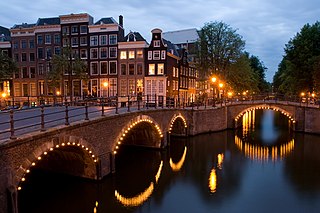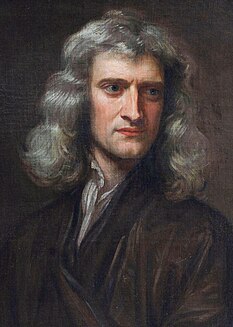Samuel Crell-Spinowski (25 March 1660 in Kluczbork – 9 June 1747 in Amsterdam) was an Arian philosopher and theologian, pastor of the church of the Polish Brethren.

Kluczbork(

Amsterdam is the capital city and most populous municipality of the Netherlands. Its status as the capital is mandated by the Constitution of the Netherlands, although it is not the seat of the government, which is The Hague. Amsterdam has a population of 851,373 within the city proper, 1,351,587 in the urban area and 2,410,960 in the metropolitan area. The city is located in the province of North Holland in the west of the country but is not its capital, which is Haarlem. The metropolitan area comprises much of the northern part of the Randstad, one of the larger conurbations in Europe, with a population of approximately 8 million.
The Polish Brethren were members of the Minor Reformed Church of Poland, a Nontrinitarian Protestant church that existed in Poland from 1565 to 1658. By those on the outside, they were called "Arians" or "Socinians", but themselves preferred simply to be called "Brethren" or "Christians," and, after their expulsion from Poland, "Unitarians".
Son of Christopher Crellius and grandson of Johannes Crellius. Samuel's mother died when he was 6, and his father then took his older brother, Christopher, and one of his sisters to England. Samuel remained with his father in Poland, who later remarried and became father of Paul (1677). It is recorded that Samuel studied in England, but when Christopher Crell Sr. died in 1680 Samuel's elder brother Christopher Crell Jr. appears to have been not in England, but studying medicine in Leiden, and did not return to take up medicine in London till 1683.
Krzysztof Crell-Spinowski was an Arian theologian, pastor of the church of the Polish Brethren.

Johannes Crellius was a Polish and German theologian.
Samuel was minister of the Socinian church in Lubniewice (from about 1706 and again from 1718) and Królowa Wola. In Prussia and Lithuania he served as a spiritual leader, as had Samuel Przypkowski and Zbigniew Morsztyn before him. He worked closely with his half-brother Paweł, 17 years his junior, who was a minister of the church in Kosinowo.

Lubniewice is a small town in Sulęcin County, Lubusz Voivodeship, western Poland, with 1,924 inhabitants (2004). It is the administrative seat of Gmina Lubniewice.

Prussia was a historically prominent German state that originated in 1525 with a duchy centred on the region of Prussia on the southeast coast of the Baltic Sea. It was de facto dissolved by an emergency decree transferring powers of the Prussian government to German Chancellor Franz von Papen in 1932 and de jure by an Allied decree in 1947. For centuries, the House of Hohenzollern ruled Prussia, successfully expanding its size by way of an unusually well-organised and effective army. Prussia, with its capital in Königsberg and from 1701 in Berlin, decisively shaped the history of Germany.

Lithuania, officially the Republic of Lithuania, is a country in the Baltic region of Europe. Since its independence, Lithuania is considered to be one of the Baltic states. It is situated along the southeastern shore of the Baltic Sea, to the east of Sweden and Denmark. It is bordered by Latvia to the north, Belarus to the east and south, Poland to the south, and Kaliningrad Oblast to the southwest. Lithuania has an estimated population of 2.7 million people as of 2019, and its capital and largest city is Vilnius. Other major cities are Kaunas and Klaipėda. Lithuanians are Baltic people. The official language, Lithuanian, along with Latvian, is one of only two living languages in the Baltic branch of the Indo-European language family.
Samuel maintained contacts with representatives of the Reformation in England, Germany and the Netherlands, among others with John Locke, [1] Isaac Newton and Anthony Ashley-Cooper, 3rd Earl of Shaftesbury, who was protector also of Paul Crell. Samuel Crell was the author of over 20 works of philosophy and theology in Latin, printed in Amsterdam, London and Königsberg. He died on 9 June 1747 in Amsterdam.

John Locke was an English philosopher and physician, widely regarded as one of the most influential of Enlightenment thinkers and commonly known as the "Father of Liberalism". Considered one of the first of the British empiricists, following the tradition of Sir Francis Bacon, he is equally important to social contract theory. His work greatly affected the development of epistemology and political philosophy. His writings influenced Voltaire and Jean-Jacques Rousseau, many Scottish Enlightenment thinkers, as well as the American revolutionaries. His contributions to classical republicanism and liberal theory are reflected in the United States Declaration of Independence.

Sir Isaac Newton was an English mathematician, physicist, astronomer, theologian, and author who is widely recognised as one of the most influential scientists of all time, and a key figure in the scientific revolution. His book Philosophiæ Naturalis Principia Mathematica, first published in 1687, laid the foundations of classical mechanics. Newton also made seminal contributions to optics, and shares credit with Gottfried Wilhelm Leibniz for developing the infinitesimal calculus.

Anthony Ashley Cooper, 3rd Earl of Shaftesbury Bt was an English politician, philosopher and writer.
It is recorded in Polish sources that Samuel had two sons, who emigrated to Georgia, America and spread Socinian teaching there.


